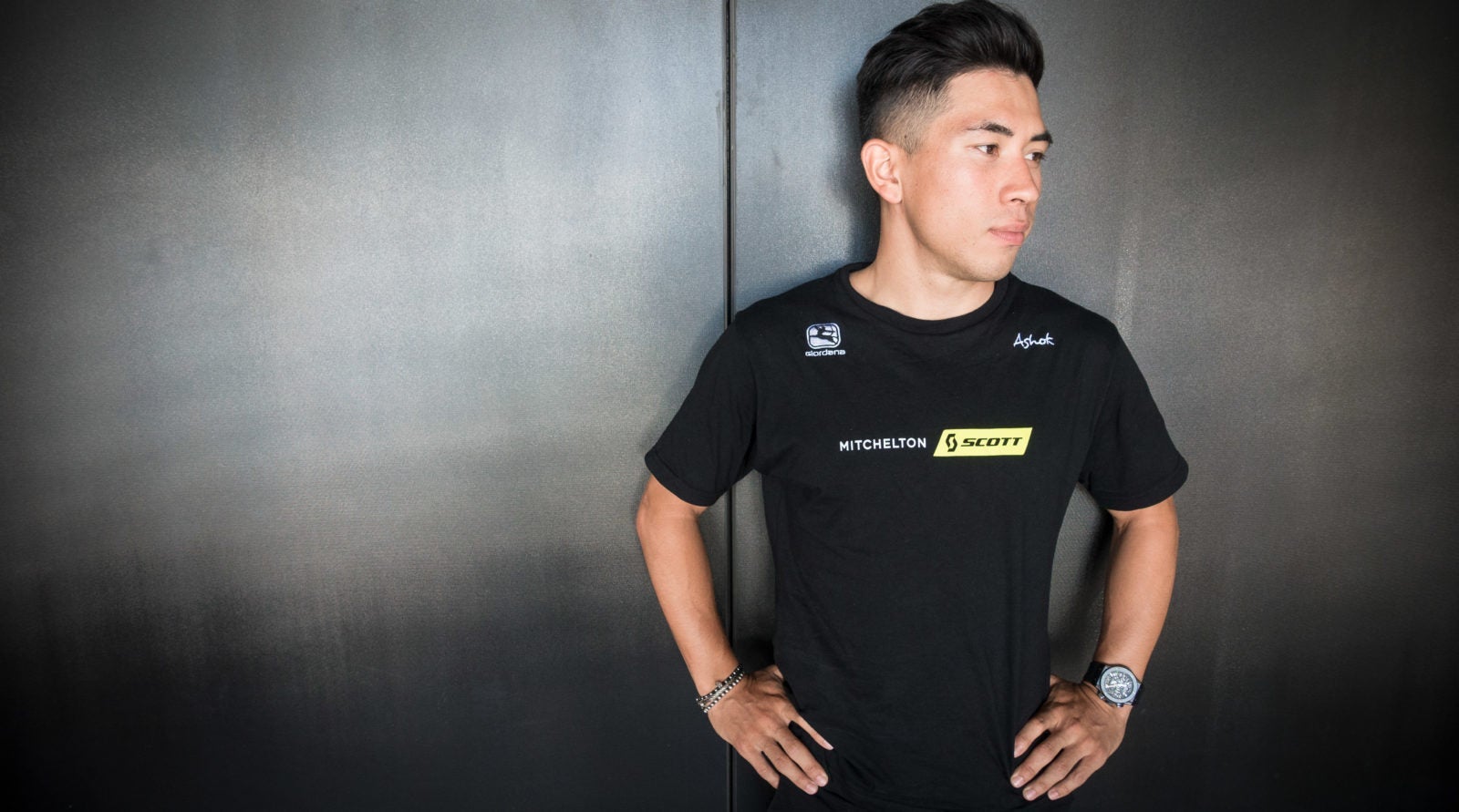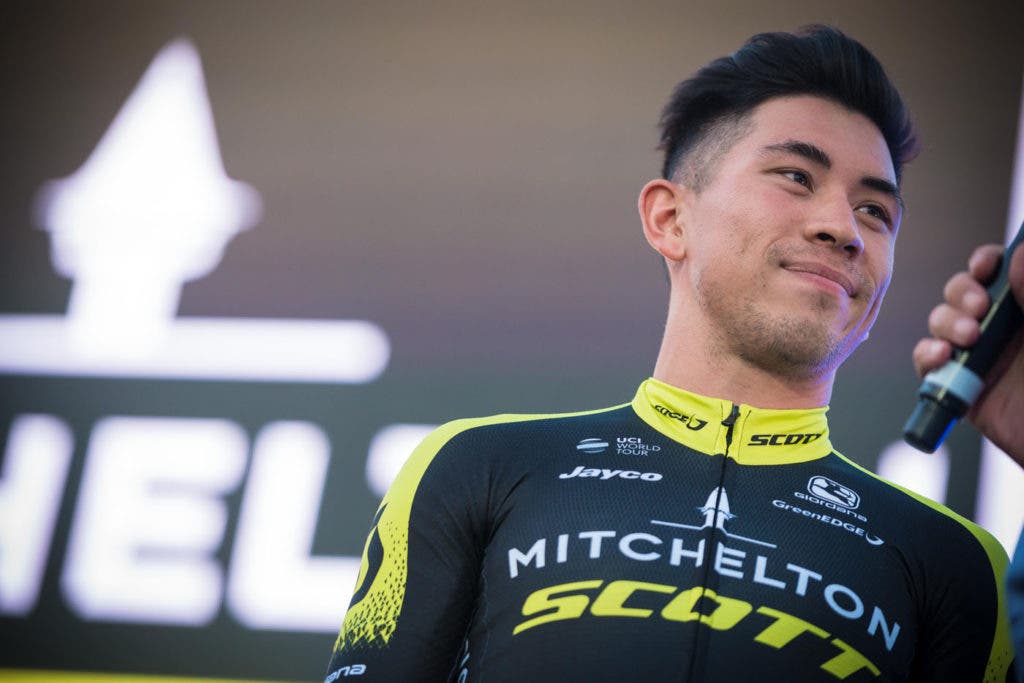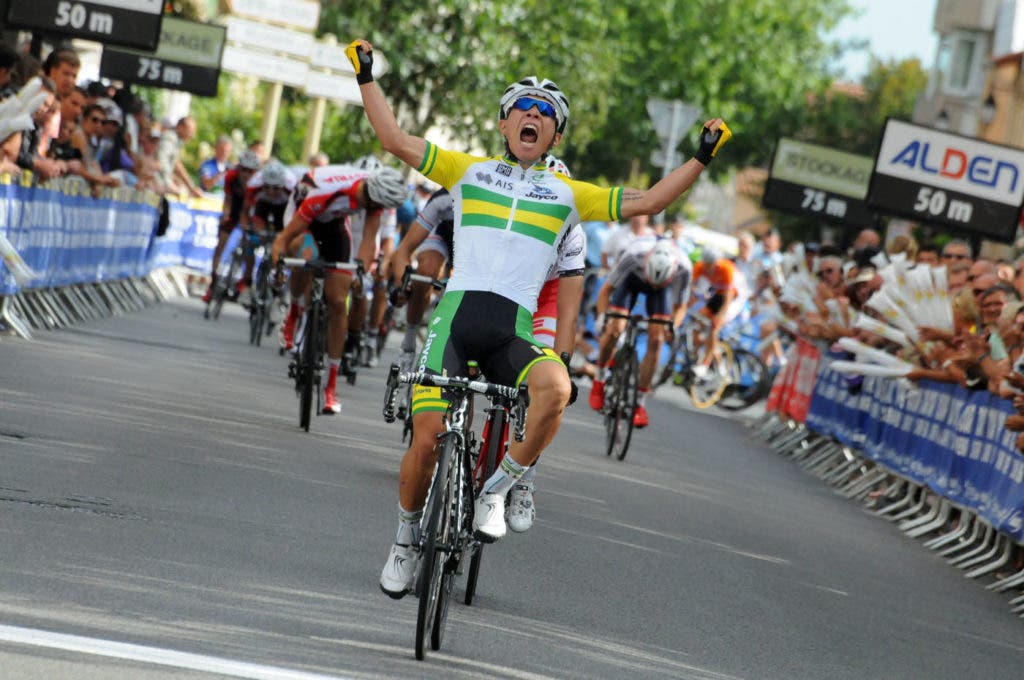Great Expectations for Caleb Ewan

Only a third-year professional, Australian Caleb Ewan is already considered one of the world’s most lethal sprinters. The 23-year-old dominated the sprints here at the Tour Down Under last year, and he is hoping to once again strike gold this week. But the Mitchelton-SCOTT team rider also has his sights set on bigger goals later in the year—including his debut at the Tour de France.
Words and images by James Startt, European Associate to Peloton
PELOTON Magazine: Caleb, you were the star of the Tour Down Under last year and you are back again this year. What is it like for an Australian to race for stage victories in the TDU?
Caleb Ewan: Well, it is pretty incredible and there is definitely a lot of motivation to do well. And that is probably even more true because of the team I am riding for. This is the only WorldTour tour in Australia and we are an Australian team so there is just a massive amount of pressure on us to do well here. In the past few years, we were juggling ambitions a bit because we also had GC riders, but this year we are just focusing on sprint stages. So I definitely have pressure, but I also have the full support of my team.
PELOTON: Caleb, you were one of the standout under-23 riders of your generation and probably the best sprinter in the world in that category. And you started winning immediately as a pro, winning a stage of the Vuelta a España in your first-year, and in 2017 a stage in the Giro d’Italia. Has the transition been as seamless as it appears on paper?
Ewan: Hmm, well, like you said, I really had a good transition. The quality of the races that I won in my first year were not super-high until I got to the Vuelta. I won maybe 12 races that season but most of them were smaller races, because the team really wanted to ease me into my first year of racing. Doing those smaller races really helped though, because I was winning races all year long. If they had just chucked me into the WorldTour I wouldn’t have won as much as I did. But they really helped me with that transition.
PELOTON: And you won a stage in the Giro this past year. Was the Giro a big step for you from the Vuelta, or was it just the next logical step?
Ewan: Well the big difference is that I went to the Giro with the expectation of winning a stage. When I went to the Vuelta in 2015, I went for experience. I wasn’t expecting to win a stage. Winning a stage was a bonus. But at the Giro last year there was more of a team around me and I was expected to win stages. Having those expectations is harder than going into a grand tour being able to do anything you want.

PELOTON: You had a tremendous start to the season last year and a lot of people were expecting you to win more in the Giro. Were you frustrated in some ways to only win one stage?
Ewan: Yeah, for sure. The first two stages were frustrating. On one stage a guy slipped away in the last kilometer and a half [Bora-Hansgrohe team rider Lukas Pöstlberger]. Usually that doesn’t happen, but it happened there and it was frustrating because I was easily the fastest in the field sprint that day and won [second place] easily. And then on the second stage, I collided with Fernando Gaviria and pulled my foot out of the pedal in the sprint. That too was really frustrating, because again I felt really good and if I had had a clear run of it, I think I would have done well in the sprint. As a result, I was playing catch-up. I was on the back foot and every day that I didn’t win became more stressful. That’s never a good position to be in. If I had won that first stage and taken over the pink jersey, well, that would have been a very different start to the Giro. I would have gone into the next stages with more confidence. They are just small things really—someone slipping away or me unclipping—but they change things so much.
PELOTON: You were also a pretty good climber when you were younger. Is that something you have been able to translate into the pros as well?
Ewan: Well, I am definitely not as good a climber as I was then. Okay, if I went back down into the under-23s now I am a better climber, but when you turn pro, the climbers are really, really good, the sprinters are really, really good, the time trialers are really, really good. It was more of a mixed bag in the under-23s. If I was climbing well in the under-23s I could maybe finish in the top 20, 30 guys. But that is not the case in the pros. Here, your weaknesses are really found out.
PELOTON: Who is the sprinter that impresses you the most today?
Ewan: I would say that Mark Cavendish is still the most impressive. To be able to win, what, 30 stages in the Tour de France, well, in modern-day cycling that is pretty unbelievable.
PELOTON: Every sprinter is different. Some guys need the big train while others are most dangerous in the last 50 meters. What kind of a sprinter are you?
Ewan: When I started, I really liked doing my own thing and I didn’t really need a train. But here at Michelton-SCOTT, the team has really converted me to going for the big leadout. And in the long run that is better, because it eliminates the risks. When you are freelancing there are a lot of things that can go wrong. When you are freelancing you have to sit in that bubble right behind the big trains. In some ways it is easier in the bubble, because you are more sheltered. But it is also easier to get boxed in or caught up in something. So while it may be a bit easier sitting in the bubble, it is hard to be as consistent.

PELOTON: You finished in the top 10 at Milan–San Remo this past year. Is that a race you think you can win as you mature physically?
Ewan: Yeah, I think that as I get older, I’ll get stronger. I am good enough now to do well at San Remo, but in the future I think that I can be even stronger. Last year, I felt really good on the climbs. I think I was like third in the bunch over the Poggio, but I maybe lacked that little extra in the sprint, and I didn’t feel as that I sprinted as well as I usually do. But hopefully I will gain physical strength as I mature and can come to the finish in a race like Milan–San Remo that much fresher. It is definitely the classic I most want to win.
PELOTON: And this year you are scheduled to ride the Tour de France for the first time. Your Michelton-SCOTT team announced this already at the start of the season. Obviously it is a big deal for both of you….
Ewan: Yeah, it is nothing short of a dream come true to be able to do the Tour. Ever since I turned pro, that is the one race I really wanted to do. I’ve constantly been at the team to let me ride it and so now that I get to ride it, well, it is nothing short of a dream come true. And like the Giro last year, I will go into the race expecting to win a stage. The team is going to want me to win. It may not be ideal to go into my first Tour de France with such an expectation on me but I wouldn’t want it any other way because, well, whenever I go to a race, I go there to win. Those are the expectations I have already on myself. I prefer it that way.
